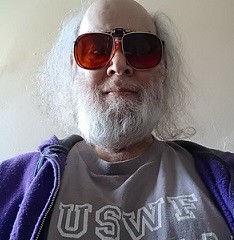Monday, January 02, 2006
Hauser on Internet Piracy of Boxing Pay-Per-Views -- But What's the Solution?
While Hauser is opposed to this practice as a form of piracy, he reports, "At present, virtually every pay-per-view fight can be seen on the Internet within an hour of the final bell."
This all raises some important issues worthy of commentary.
First of all, the pay-per-view pirates are not only stealing from the monopolies like HBO, which may seem to lessen or remove the ethical qualms for some people if not the legal ones for this digital piracy. The fact is that the pirates are also stealing directly from the fighters themselves.
Most fighters receive some type of percentage of the pay-per-view revenue, often when the number of buys passes a certain level, as part of their purses. The media giants like Time Warner's HBO may be around for a long time, but most fighters' careers, especially as pay-per-view attractions, are short. And on top of this they still have no union, no medical coverage, no pension, no collective bargaining, etc.
Next, many of these file-sharing networks have been known to be loaded with spyware and adware. The users risk ruining their computers or at least having to endure the usually difficult and near impossible task of cleaning out this junk, just to watch a free fight. I haven't heard this directly about boxing videos or done it myself, but reports abound about this occurring on other videos and, of course, for music file-sharing. So if you roll around in the mud with these Internet thieves, you are going to end up quite dirty.
However, Hauser misses a few key points in his analysis.
He asks, "How can the industry fight it? The answer involves a panoply of legal issues ranging from copyright law to the governance of cyberspace."
While he cites the fiasco of the music industry's response as an example of what not to do, in essence he advises the boxing networks to follow a similar path.
File-sharing of music blossomed in large part because music fans were sick and tired of paying between 12 and 18 dollars for an entire album which had only one or two songs on it they wanted. The albums were often designed to limit the amount of potential hits on them and were loaded up with filler. You could always tell your baby you loved or missed him or her in a song next year.
In the old vinyl days, fans mainly bought 45 RPM singles. Albums began to become more popular in the 1960's with concept albums of longer songs, and these remained popular for some time. But in the CD age, the recording companies de-emphasized singles and packed most albums up with junk.
After its absurd attempts to stop the use of the Internet for the delivery of music, the industry finally adapted to it, with legal downloads of individual songs for 99 cents apiece now widely available.
Boxing faces a similar problem but without a similar solution being evident. Major title fights migrated to pay-per-view after the non-pay networks could no longer get enough advertisers to support these events. Boxing's rampant corruption resulted in most non-beer sponsors deciding that they didn't want to be associated with what was going on in and out of the ring, and they hightailed it to the growing selection of other televised sporting events. Similarly, high-profile deaths and major injuries in the ring shown live and in dying color scared them off as well. Could you imagine an unconscious and battered fighter being shown carried out of the ring on a stretcher followed by a commercial to be happy and eat at McDonald's?
The response of the ever-shortsighted boxing industry was to move these events to pay-per-view. That, however, led to its own set of problems. Entire generations no longer can see title fights unless they cough up 50 bucks. That has helped marginalize boxing even further.
In addition, the proliferation of almost monthly major pay-per-views along with countless smaller ones, both of varying quality and too often involving bad fights or mismatches, has disgusted many fans.
So just as the greed and monopoly practices of the music business made it easier for illegal file-sharing and piracy to grow, so have the similar practices of the boxing and pay-per-view industries.
In boxing, however, there is no equivalent of a song which can be a hit as a single and sold for a profit at 99 cents. The solution has to involve better pay-per-views made available legally, and also online for lower prices.
But it also must involve getting major title fights back on for free, whether on TV, online, or both. That means cleaning up the sport, including regulating these networks as the promoters they really are in this digital age. The cable industry monopolists have remained opposed to this, again showing shortsightedness is not only a trait of the old-line, individual fight promoters.
If they keep charging 50 bucks for fights of questionable quality, on top of the always rising monthly cable subscription fees, for what we used to get for free, there will be more and more piracy, regardless of the rearguard legal and technological hurdles they may try to put in place. Piracy may be wrong and illegal, and two wrongs may not make a right, but if the cable and boxing suits continue on the path they have chosen outlined above, they will lose this battle.
In the end, the undermining of this pay-per-view revenue base will prove even worse for the fans and fighters. Thus a mutually self-destructive battle is underway, with no clear end in sight.
Another great post, though the implication that music and PPV piracy is, in part, a protest against mediocrity and corruption is fatuous. The motive for piracy is entirely economic.
I've no doubt the pirate-to-purchase ratio of Castillo-Corrales II was the same as it was for both Hopkins-Taylor fights, just as the ratio of illegal downloads to actual CD sales for Britney Spears is the same as it is for any other popular musician.
Some people pay, others don't, and no amount of lipstick can pretty up this pig.
First, as to piracy, the motivation is only one issue. I agree that it is not a valid or genuine protest, but, like other forms of stealing, the conditions which gave rise to it must be examined if it is to be dealt with.
If there is a non-competitive situation, as exists to a large degree with cable, the prices are artificially high, and more people will fall for the temptation to steal it. Plus, the service is abysmal -- one of the digital cable boxes I PAY for from Time Warner is out again tonight, as I have periodically mentioned. Unlike other areas, getting satellite where I live gets very complicated. So we are stuck with this virtual monopoly.
That doesn't excuse stealing, but if a store charged ten dollars for an apple, there would be more stealing than if they charged 99 cents a pound.
As for ESPN, when they had their boxing pay-per-view in April, I did not yet have digital cable. ESPN distributed it themselves, meaning it was not on In Demand, owned by a consortium of cable companies led by (guess who?) Time Warner. It was only available here on digital cable, so short of running out and upgrading (which I was told I had to do by Sept., which I did), I could only see it online, which I also did. Thus there wasn't as much direct competition between the cablecast and the webcast.
But your point is well-taken. A few years ago, when UFC was banned on cable but was still on satellite, they were planning a pay-per-view webcast. That was cancelled when the word was put out that if they did that, they could forget about being shown on satellite.
Webcasting can, however, open the door to distributors who probably wouldn't get on cable anyway, even the digital tier. The Universum promotion in Germany is experimenting with webcasting, and so are some other sites like Secondsout.com. But cable and satellite would blackball anyone who tried Internet pay-per-view for something they deemed widely marketable in the U.S.
Antitrust, you ask? What are you, one of those damn commies like Teddy Rosenfeld?
1. The only "condition" that gives rise to piracy is the desire to get something for nothing. If a store were selling apples for ten dollars, theft wouldn't rise - the store simply wouldn't sell any apples.
Cable's monopoly status is a joke, of course, but breaking up the monopoly wouldn't engender less piracy, only lower prices. Thievery is not the rational desire for the lowest price taken to its final conclusion; it's an attempt by someone to circumvent economics - and a number of other considerations - entirely.
2. As for the music industry, I'm a bit less willing to cast aspersions. There are lots of people who don't work at record companies and who don't play in bands and who don't distribute CDs and who don't manage artists, and all of them - five years after the fact - are engaging in easy ridicule over what is essentially an impossible situation for people who have a make-a-living stake in the business.
I feel sorry for everyone involved, since no one really knows how it will all shake out.
3. What the hell is an "MSO"? Is that a reference to cable carriers? If so, it's a ludicrous point, akin to saying movie tickets would run only five bucks if those pesky theaters or worthless studios didn't get their cut.
I just don't get the reference. I'm old.
Best,
Brian
Best,
Brian
5 Comments:
This comment has been removed by a blog administrator.
By Brian Moore, at 11:24 AM
Eddie,
Another great post, though the implication that music and PPV piracy is, in part, a protest against mediocrity and corruption is fatuous. The motive for piracy is entirely economic.
I've no doubt the pirate-to-purchase ratio of Castillo-Corrales II was the same as it was for both Hopkins-Taylor fights, just as the ratio of illegal downloads to actual CD sales for Britney Spears is the same as it is for any other popular musician.
Some people pay, others don't, and no amount of lipstick can pretty up this pig.
By Brian Moore, at 11:26 AM
I think that viewing the problem as analogous to the music industry is very accurate. If fights were shown via PPV over the internet then the price could immediately be halved as the MSOs take 50% off the top of every PPV sale. That said, the MSOs fit the same role as brick and mortar music stores used to fill. If HBO and Showtime started offering their shows online, the MSOs would rebel, undermining the entire marketing system that currently exists. For this reason, we will not see fights available over the internet at the same time as on television in the enar future (I don't understand how ESPN made it work for their PPV card).
By , at 4:47 PM
Thanks for the comments. I spoke with Tom Hauser today, and he said he got more response from this piece than any he has written in a few years.
First, as to piracy, the motivation is only one issue. I agree that it is not a valid or genuine protest, but, like other forms of stealing, the conditions which gave rise to it must be examined if it is to be dealt with.
If there is a non-competitive situation, as exists to a large degree with cable, the prices are artificially high, and more people will fall for the temptation to steal it. Plus, the service is abysmal -- one of the digital cable boxes I PAY for from Time Warner is out again tonight, as I have periodically mentioned. Unlike other areas, getting satellite where I live gets very complicated. So we are stuck with this virtual monopoly.
That doesn't excuse stealing, but if a store charged ten dollars for an apple, there would be more stealing than if they charged 99 cents a pound.
As for ESPN, when they had their boxing pay-per-view in April, I did not yet have digital cable. ESPN distributed it themselves, meaning it was not on In Demand, owned by a consortium of cable companies led by (guess who?) Time Warner. It was only available here on digital cable, so short of running out and upgrading (which I was told I had to do by Sept., which I did), I could only see it online, which I also did. Thus there wasn't as much direct competition between the cablecast and the webcast.
But your point is well-taken. A few years ago, when UFC was banned on cable but was still on satellite, they were planning a pay-per-view webcast. That was cancelled when the word was put out that if they did that, they could forget about being shown on satellite.
Webcasting can, however, open the door to distributors who probably wouldn't get on cable anyway, even the digital tier. The Universum promotion in Germany is experimenting with webcasting, and so are some other sites like Secondsout.com. But cable and satellite would blackball anyone who tried Internet pay-per-view for something they deemed widely marketable in the U.S.
Antitrust, you ask? What are you, one of those damn commies like Teddy Rosenfeld?
By Eddie Goldman, at 9:44 PM
Eddie,
1. The only "condition" that gives rise to piracy is the desire to get something for nothing. If a store were selling apples for ten dollars, theft wouldn't rise - the store simply wouldn't sell any apples.
Cable's monopoly status is a joke, of course, but breaking up the monopoly wouldn't engender less piracy, only lower prices. Thievery is not the rational desire for the lowest price taken to its final conclusion; it's an attempt by someone to circumvent economics - and a number of other considerations - entirely.
2. As for the music industry, I'm a bit less willing to cast aspersions. There are lots of people who don't work at record companies and who don't play in bands and who don't distribute CDs and who don't manage artists, and all of them - five years after the fact - are engaging in easy ridicule over what is essentially an impossible situation for people who have a make-a-living stake in the business.
I feel sorry for everyone involved, since no one really knows how it will all shake out.
3. What the hell is an "MSO"? Is that a reference to cable carriers? If so, it's a ludicrous point, akin to saying movie tickets would run only five bucks if those pesky theaters or worthless studios didn't get their cut.
I just don't get the reference. I'm old.
Best,
Brian
Best,
Brian
By Brian Moore, at 4:52 PM
5 comments Tweet
















